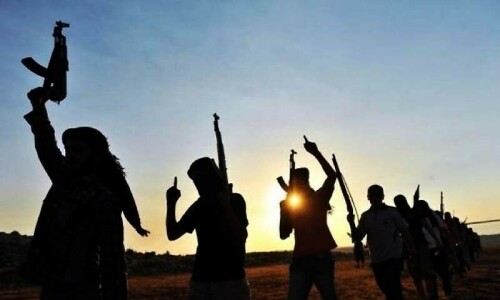ALTHOUGH the Karachi Stock Exchange has risen over 50pc over the last year, financial analysts have not rushed to declare Pakistan a ‘bull market’.
The reasons for their caution are obvious: terrorist attacks, a continuing conflict next door in Afghanistan, a roller-coaster relationship with the US, outstanding disputes and rivalry with India and an economy that could collapse without emergency treatment.
It will take years to eliminate extremist violence completely. Meanwhile, terrorism can be contained through smart security and political strategies. Afghanistan can be helped to achieve relative if not complete peace. Relations with a disengaging yet domineering America and an ambitious yet anxious India can be managed by clear-headed diplomacy.
But Pakistan’s economy cannot be saved from meltdown by half measures and patchwork solutions. If reforms are avoided because they are politically difficult, Pakistan’s economy may limp along for a while on life support, but it will eventually collapse under the burdens that a rapacious elite has imposed on it.
The irony is that, unlike the security issues, the solutions to the current economic challenges are fairly clear and require only political courage to be implemented.
Continued deficit spending will lead to hyperinflation and economic meltdown. A tax regime which generates only 10pc of GDP as revenues cannot provide for the infrastructure, social services, security and defence needs of the country. It must be made comprehensive, fair and efficient.
Doubling tax revenues to 20pc of GDP — the norm in most dynamic economies — within three years is not an unrealistic expectation. Similarly, the haemorrhaging of public money through the loss-making ‘autonomous’ corporations — Steel Mills, PIA, Railways — can be stopped through structural rationalisation and privatisation, as was successfully achieved in the banking sector over a decade ago.
Moreover, at present these solutions can be achieved domestically without external involvement. The incoming government has the parliamentary majority and public support to implement such economic reforms. And without the fiscal restructuring other declared aims, such as overcoming the energy crisis, cannot be achieved.
If these reform measures are delayed, for example by securing a credit line from Saudi Arabia, the financial reckoning may be postponed. But if the breathing space is not used to bring public spending and revenues into balance, the threat of economic collapse will catch up with the country sooner rather than later.
Then, the solutions for the stabilisation of the economy will be imposed externally by the IMF and its masters. The economic and political pain will be much greater. Not only will the government suffer economic humiliation, its ability to conduct independent and nationally oriented security and foreign policies will also be compromised.
Perhaps the most compelling reason for implementing these reforms is that they will unlock Pakistan’s immense economic potential. It may still be a secret, but Pakistan is one of the most attractive destinations for private equity investment. Here’s why:
— Pakistan, the world’s sixth most populous country (over 180 million), is a huge market;
— Its middle class (63 million) is a higher proportion of its population (35pc) than other South Asian states (India 25pc, Bangladesh 20pc);
— Domestic demand in Pakistan is a higher percentage of GDP (84pc) than other Asian and emerging markets;
— At an average age of 22, Pakistan’s population is younger than other emerging markets, providing both a labour pool and the future demand to fuel growth.
Investment opportunities in Pakistan can be identified in a number of sectors: power generation, consumer goods, food and agriculture, housing, healthcare, education, financial services, information technology, transport, oil and gas and infrastructure. These investment opportunities are generated by several factors.
First, the economy has been starved of investment for almost a decade. There is a huge accumulation of unmet demand in almost every sector. This is magnified by the rapid rise in disposable income.
Second, there is a very low degree of value addition in Pakistan of raw materials and exports, opening prospects for the expansion of manufacturing (and employment generation) in sectors such as textiles, food processing and electronics.
Third, Pakistan’s massive infrastructure needs cannot all be met by government-financed projects; there is a very large space for private-sector investment and public-private partnerships to build infrastructure.
Thus, from an investment perspective, Pakistan is a ‘target-rich’ environment.
Apart from the global private equity investors, there are strategic players — China, Saudi Arabia and other Islamic countries — which are prepared to invest very large amounts in Pakistan if they are convinced of the country’s economic stability and an end to the rampant corruption of the recent past.
It would be much wiser for the new leadership to focus on generating such strategic investments in Pakistan rather than asking for handouts and financial favours from friends.
Fiscal reform and a wider tax net will, no doubt, impose some pain and evoke political protests from those affected. The reforms can be structured to ameliorate the impact on the rural and urban poor. Moreover, if the reforms are going to provoke some protest, it is better for the government to face this now, early in its tenure, rather than after some years when another election may be in the offing.
If reforms are introduced now, their positive impact — stabilising the economy and generating large investments, growth and employment — will become evident in a couple of years and assist the government’s future electoral prospects.
The stakes are high in the decisions to be taken by the government on fiscal and tax reform. It should not only consider the impact of the anticipated opposition, mostly from vested interests, it should also weigh the long-term costs and benefits of these decisions for itself and for Pakistan.
The writer is a former Pakistan ambassador to the UN.












































